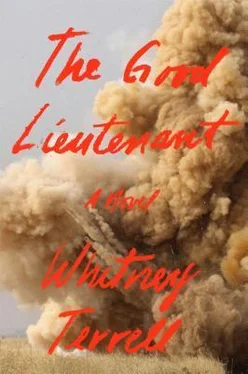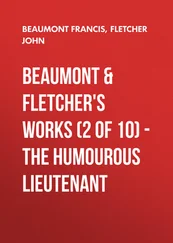This was not meant as an indictment of Hartz — more like a compliment, since she knew that he’d previously been divorced, that his kids from his first marriage lived in Cleveland, and that his ex-wife had remarried a consultant, who made twice what a captain’s salary could ever be. But she could also tell that Hartz was not going to take it that way. She glanced over at Pulowski. He’d had an outbreak of acne and his shoulders looked bony and un-Gibson-like, but the skin along his neck was as soft and milky as the skin of Mel Gibson’s wife in her negligee. “Why conceited?” said Hartz.
Pulowski gave her a smirking grin. They were in their manicured backyard, Fowler tending the grill with a cigar in her mouth, Pulowski wearing a checkered apron, carrying out a silver tray of condiments. “Because he’s not really leading,” Fowler said. “He’s putting on a display. I mean, the guy loses a bunch of soldiers. What about that scene where he has his helicopters buzz by his men in the hangar—”
“Which was awesome,” Anderson said.
“—which was totally unnecessary. Why didn’t he just take them out to the landing pad? Why? Because he’s acting. He wrote the movie, right?”
Pulowski yipped laughter. She loved the sound of it — even if she was really just talking about herself. Who wouldn’t want to lie to make themselves look better than they did? Hartz was close enough then that she could smell the coffee on his breath, see the small bright tears along his cuticles. If anybody deserved an Oscar in this room, it was him, for patiently putting up with crap like this. I’m going to be a fake and a coward my entire life , she thought angrily. I’ll lose control of my platoon. I’ll be court-martialed for incompetence. “All right, Fowler,” Hartz said. “Let’s say you were leading four hundred infantry soldiers into the Yo Drang Valley. Who would you want to act like?”
Ia Drang Valley , she thought. She was also trying to think of the name of even one woman who’d led an infantry charge, anywhere, in the Army’s history.
“Eisenhower,” she said.
This name produced an almost physical contraction of boredom in the room, as if a great shadowing cloud had passed overhead. Hartz licked his chapped lips and glanced up at the ceiling. “He was a general, Fowler. Not a colonel.”
“Yeah, well, before any of that, he lived around here,” Fowler said. “We had to take a field trip to his house when I was a kid.” It was actually a field trip she’d taken twice, once for freshman history, and then again when Harris had been in the same class and he’d missed the field trip bus so she’d driven him up to Abilene personally — a good excuse to spend the afternoon together. But instead she’d been pissed off because he’d tried to ditch the class. A three-hour round trip, on a sunny fall day, during which she had not spoken — time that now she’d give anything to have back.
“Well, then,” Hartz said, “maybe you should tell us a little bit about what made the general so great.”
This time, instead of Pulowski in a negligee, she imagined Harris, acting just as loving and well-behaved as all of Mel Gibson’s kids. Harris waiting for her on the screened front porch of her perfect officer’s digs. No cigarettes, no dope, no Black Sabbath shirts, no angry resentment at her rules. Eisenhower had five brothers, and one of them had injured and eventually lost an eye when Ike was taking care of him. He never forgot his failure to protect someone who was weaker than him, who relied on him. And then later, when his family ran out of money, Dwight let his older brother Edgar go to college while he worked night shifts at the local dairy. “The thing about Eisenhower,” she said, “was that he never sat around thinking about how he was going to look to somebody. He didn’t try to impress people. He didn’t act. He wasn’t showy. He was boring. He would’ve thought boring was good.”
“That’s an interesting perspective,” Hartz said
Way to go, Fowler , she thought, now that she’d finished speaking. Nothing like speaking up in class to inform your commanding officer that you don’t really want to be interesting. “Think about it this way,” she said. “How many people have seen any movies that Eisenhower made?”
“If there wasn’t any movie,” Anderson asked, “then how the hell do you know so much about this?”
“I read a book about him for a class,” Fowler said, flushing now, humiliated. Goodbye to Pulowski in his negligee. Forget about backyard barbecues and adoring children. Forget about fitting in. There’s a beat-down on the way.
“Sir,” Anderson said, his wand waving in the air. “I think that the lieutenant had a good point, sir. I think we need to spend a lot more time reading, sir. That’s one of the real mistakes that I felt that Colonel Moore made in the Io Drone Valley, sir. I kept looking for it, sir, but during the entire battle, nobody read a single book. It was shocking, sir, if you ask me.”
“There’s nothing wrong with a soldier being interested in history,” Hartz said. “I’m sure the colonel would appreciate your thoroughness.” His tone was odd, not a warning, exactly, but the opposite of a compliment.
In other words, he had no idea what to do with her — the exact conclusion that she most feared, particularly from the men who were in charge of things. I got a book you should read , she thought, and imagined Anderson in a miniskirt and heels and tried, desperately, to inject this thought clear across the room into Pulowski’s brain.
In September, four months before their deployment, Fowler disassembled and rebuilt the hydraulic system on the Hercules, having ordered new hoses through the requisition office. The pattern of the hoses, as they branched and divided through the interior of the machine, was a reassuring puzzle, complicated but never contradictory, the return lines and outgoing lines perfectly balanced, like the arteries in a heart. By the end, each was flagged, the pattern fully memorized by herself and by Sergeant Eggleston, whom she had chosen to command this machine, and all the rest of her NCOs. Having made the Hercules whole, they would soon have to break it all down again for transport to Iraq, but before they did, they spent weekends trundling the great big squat machine patiently out into the soybean fields, a deeply unsexy, dowdy beast waddling up to creek beds and hauling out logs, clanking out to the motor pool and hooking its tow cable to decommissioned tanks, to truck cabs, to Fowler’s beater F-150.
Now, lying beside Pulowski in the La Quinta Inn, she guiltily compared the puzzle of the Hercules to the puzzle of the signal officer she had now slept with four times. Physically, things clicked just fine, though she was beginning to worry that the other parameters of their relationship weren’t going to be as cut-and-dried. “You gonna ever tell me anything about yourself?” Pulowski asked, rolling over on his side. “Or are these meetings going to be just, kind of, a refreshing form of PT?”
“What do you want to know?” She slid one leg over Pulowski’s skinny midsection and sat up high atop him, so as to feel less vulnerable.
“What about your family?”
“Divorce,” she said. “Mom remarried, like, fifteen years ago. Lives in Oregon. So not really in touch. And I got a brother, Harris, who”—she poked him in the nose with her finger; playful, but also reminding him that he was an outsider to this whole thing—“is not a big fan of my joining the Army.”
“Sounds like my kind of guy.”
“I thought you had a sense of humor.”
“I do.” He craned his neck to catch a glimpse of the TV behind her, where Leno was talking. “Speaking of which—”
Читать дальше












